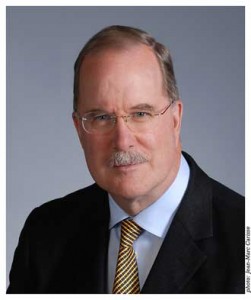
By Pascal Zamprelli
A renowned and respected journalist and author with close to 40 years of journalistic experience, Graham Fraser was appointed Canada’s Commissioner of Official Languages in 2006. During a long and distinguished career that has straddled the language divide, Fraser has reported in both official languages on issues affecting Canada and Canadians, including cultural and foreign policy, constitutional debates and negotiations, and provincial, national and international politics. On Wed., Nov. 18, Fraser was on hand to deliver the 20th F.R. Scott Lecture, J’y suis, j’y reste: F. R. Scott and the Evolution of Language Rights. Before the event, the McGill Reporter asked him Four Burning Questions.
Q: You’ve worked as a journalist for both French and English language media outlets. What unique understanding of the tensions surrounding language questions in Quebec did you gain as a result?
I was only a guest columnist for Le Devoir, so it does not really count as a workplace experience. My most useful experiences in the workplace were the seven years I spent as a member of the Tribune de la Presse at the Quebec National Assembly, and the various election and referendum campaigns that I covered during periods in which language was particularly emotional. I learned that language sensitivities are related to a collective sense of security; the more secure people feel, the more generous they are toward language minorities; the more insecure they feel, the more they feel threatened and hostile.
Q: You once received an award for “excellence in public policy journalism.” How did you see your role with respect to influencing policy-makers as a journalist, and how does that compare with your influence today as Commissioner of Official Languages?
One of the hardest things to measure is influence, either as a journalist or as Commissioner. As a journalist, my views were very public, but their influence was usually indirect at best. As a Commissioner, I have a wide variety of tools – speeches, articles, investigations, audits, reports, appearances before Parliamentary Committees, personal interventions with departments, senior officials or ministers – but less control over how widely those acts will be discussed publicly. As a journalist, my goal was to inform and to stimulate discussion; as a Commissioner, my role is to achieve results – but through actions by others.
Q: In what ways has the language debate in Canada evolved over the course your career?
When I first became interested in language issues, the subject was a highly emotional one; both the Prime Minister and the Leader of the Opposition were unilingual Anglophones, and the sound of an English-speaking Canadian speaking French was sufficiently rare to turn heads and provoke curious remarks. It was extremely difficult for French-speaking Canadians to get service from the federal government in French. Now, the issue has lost much of its passion and intensity; it is difficult to imagine unilingual political leaders. The language challenge is quite different: over 90 per cent of the jobs designated as bilingual in the federal government are filled by people who have met the language qualifications, but there is still often little sense that linguistic duality is a critical part of Canada’s
identity.
Q: What are your thoughts on F.R. Scott’s contribution to the language debate and language rights in Canada?
F. R. Scott defined language rights as human rights, and throughout his career he fought for a better understanding of the French fact in Canada – and the English fact in Quebec. He brought a poet’s sensibility to the law, and a lawyer’s precision to poetry.
